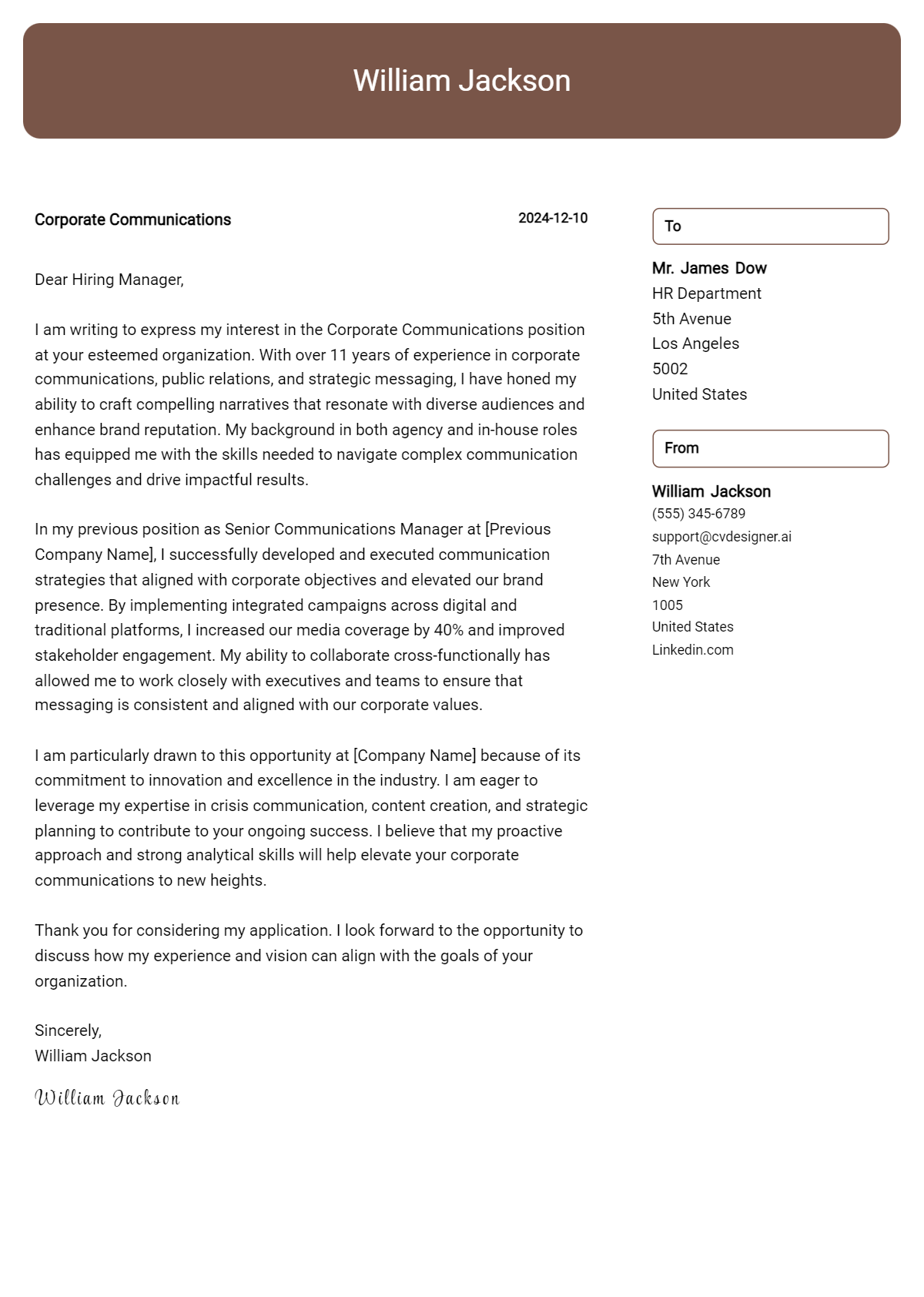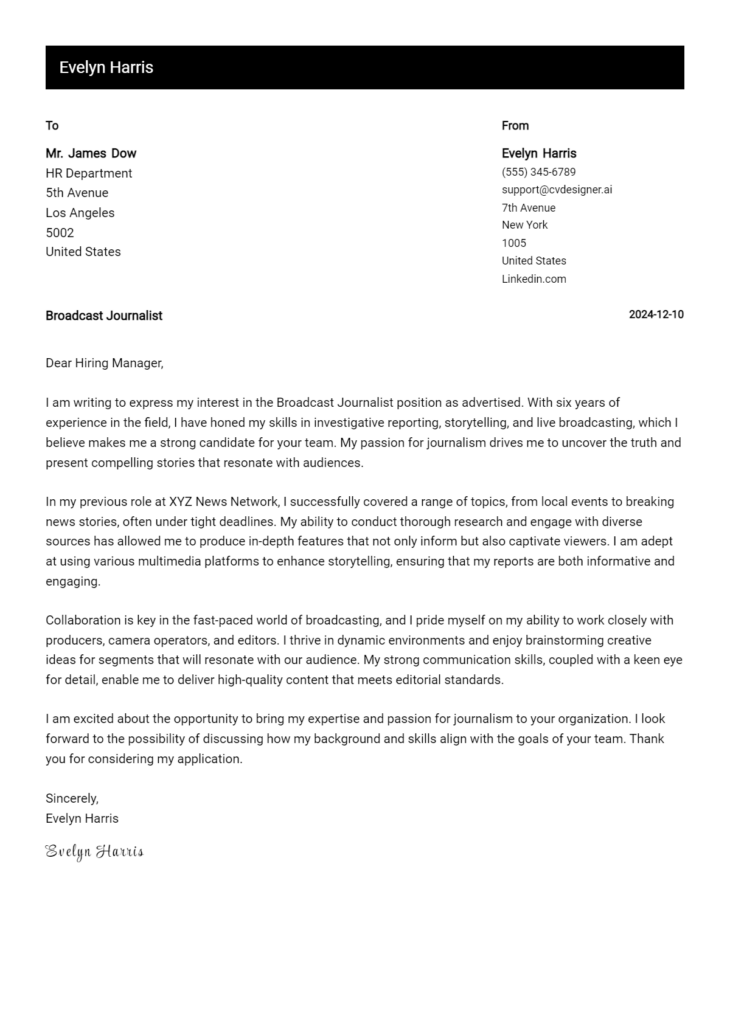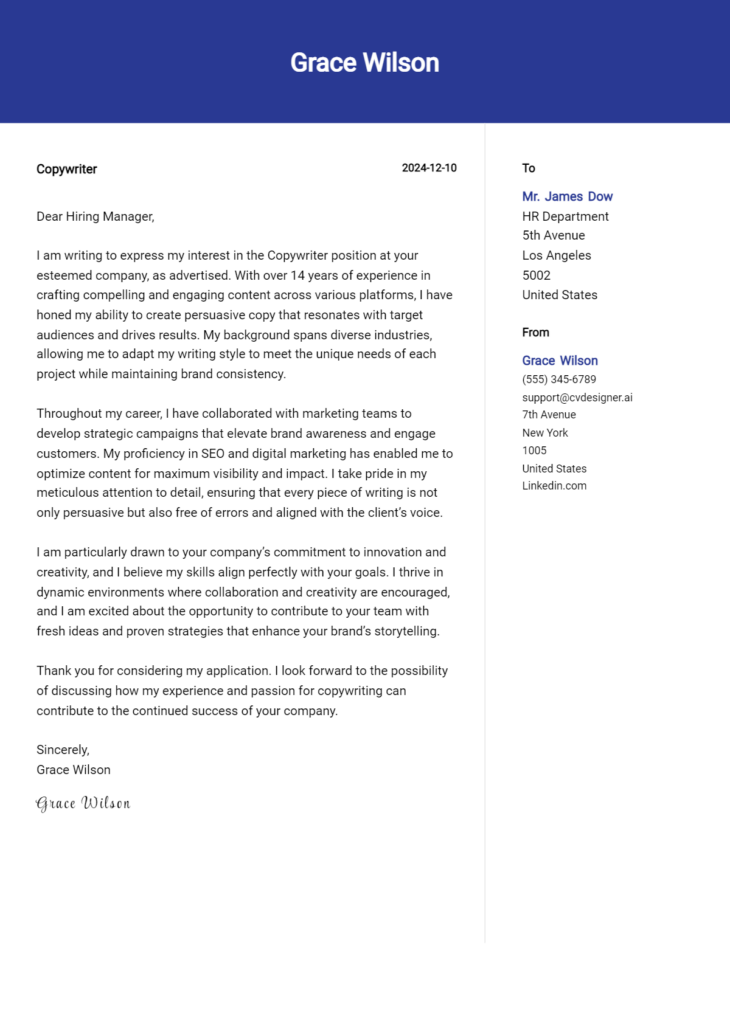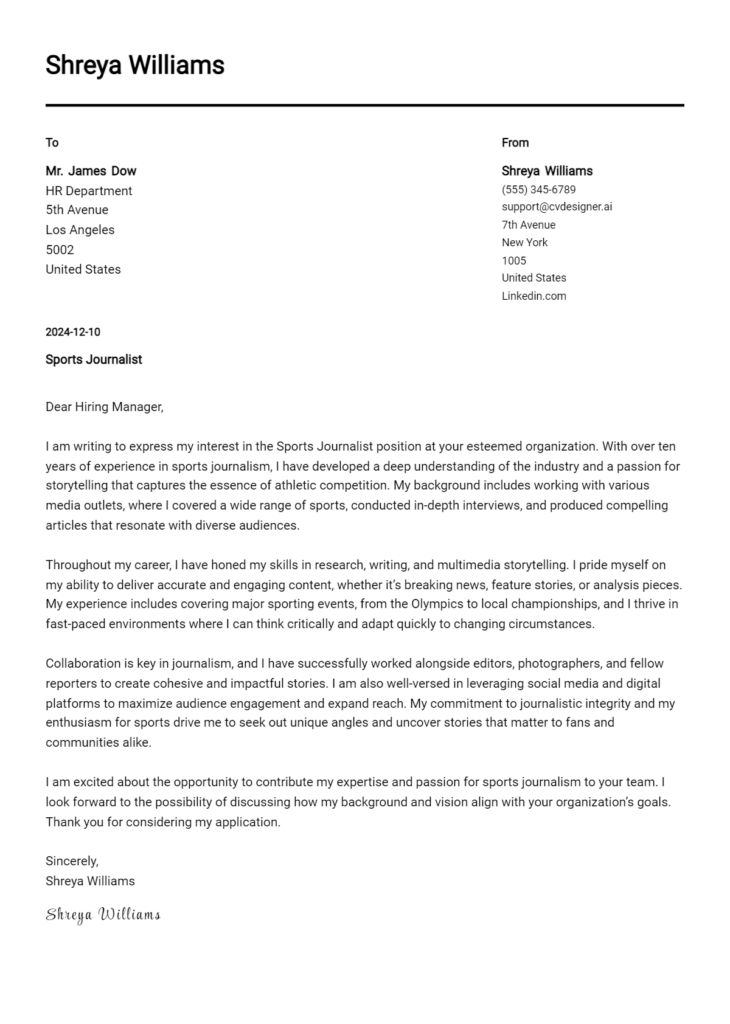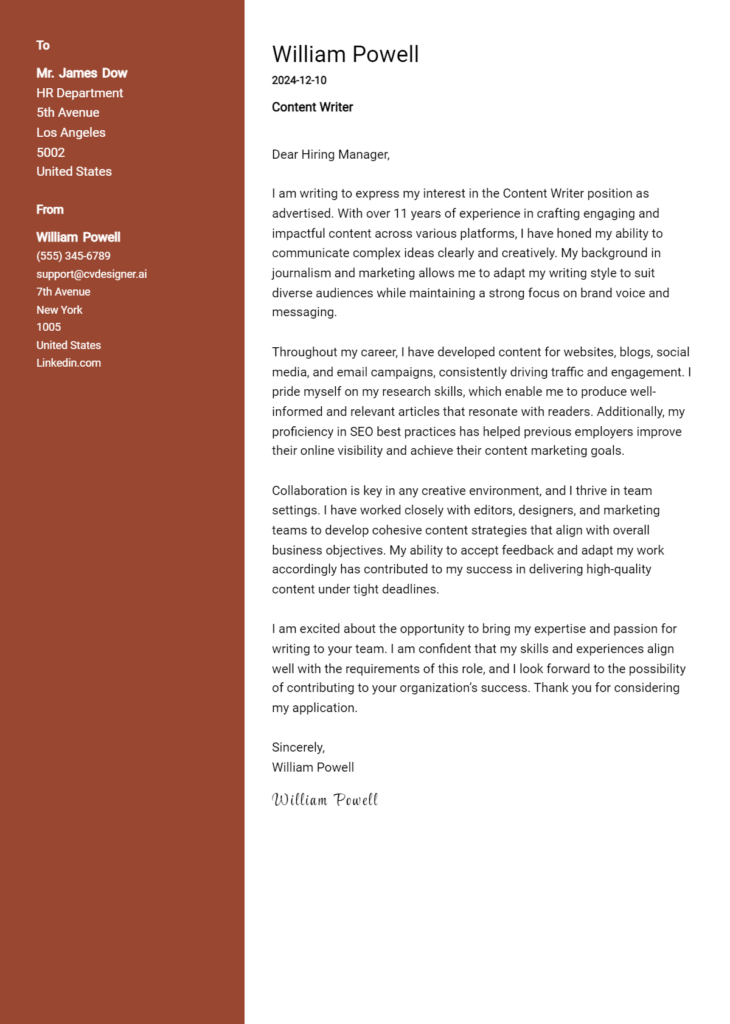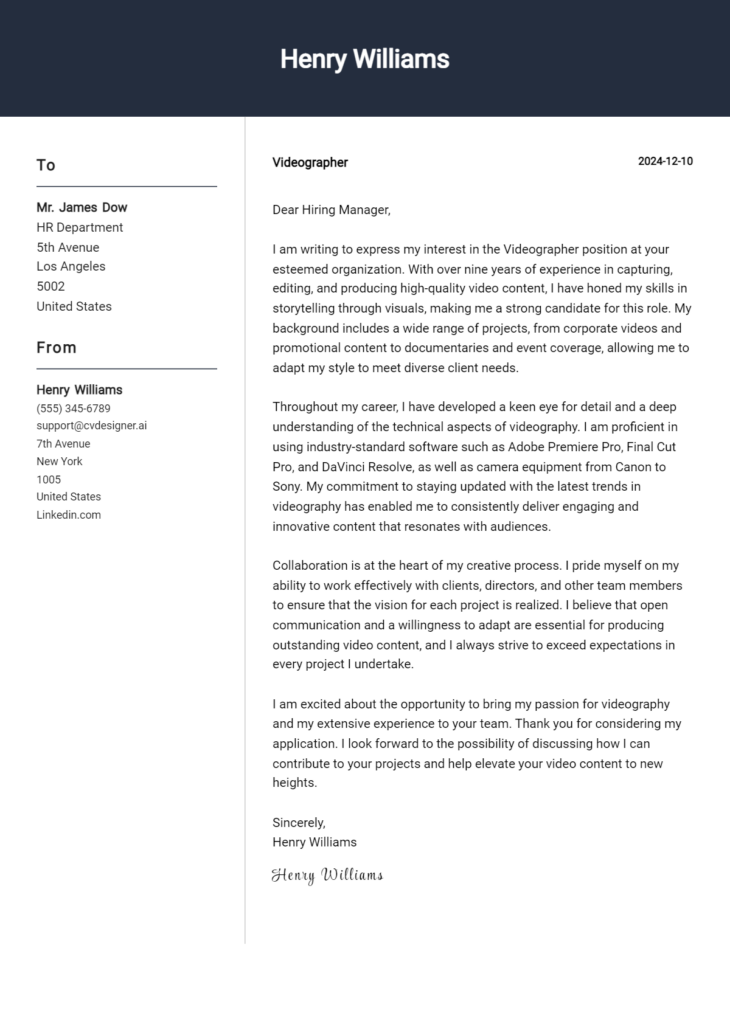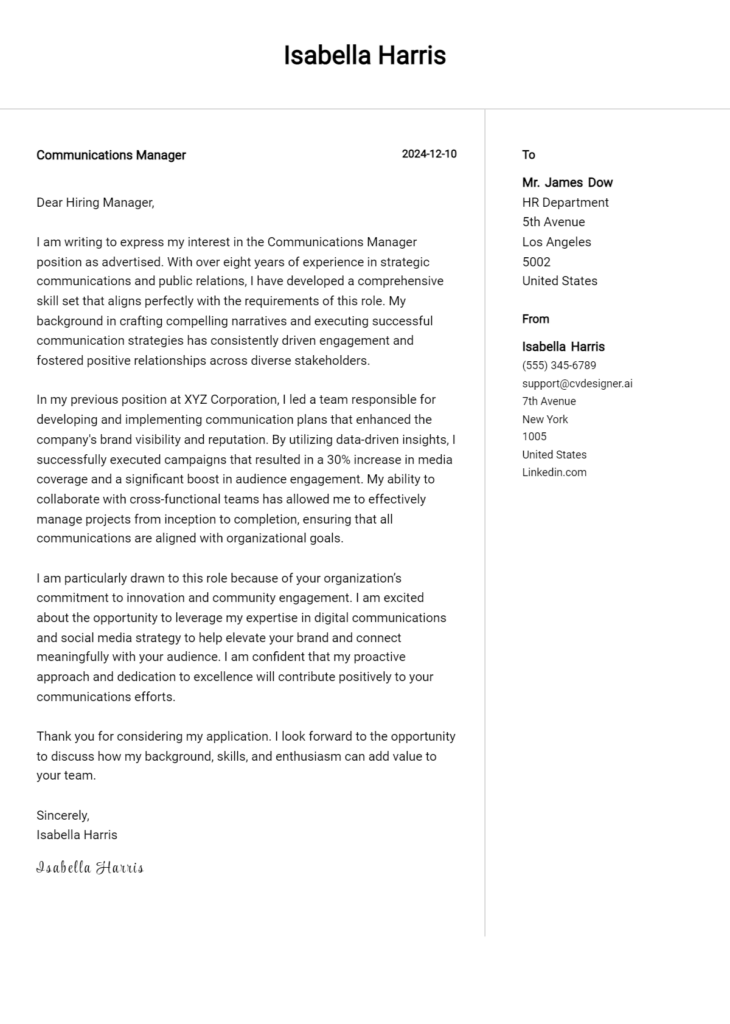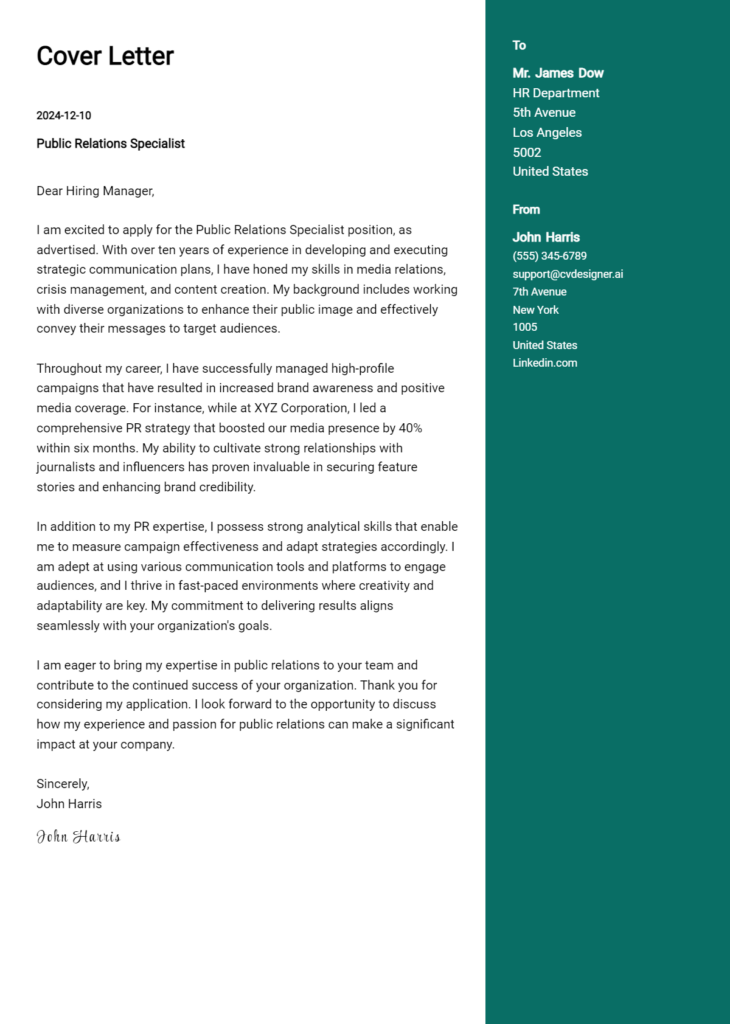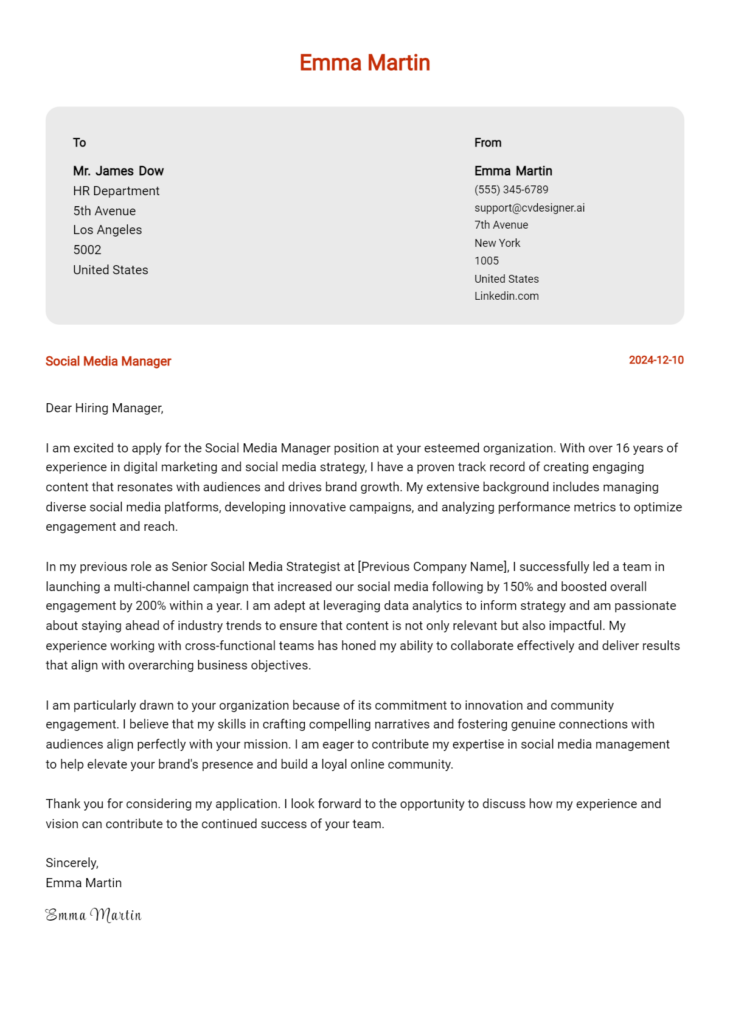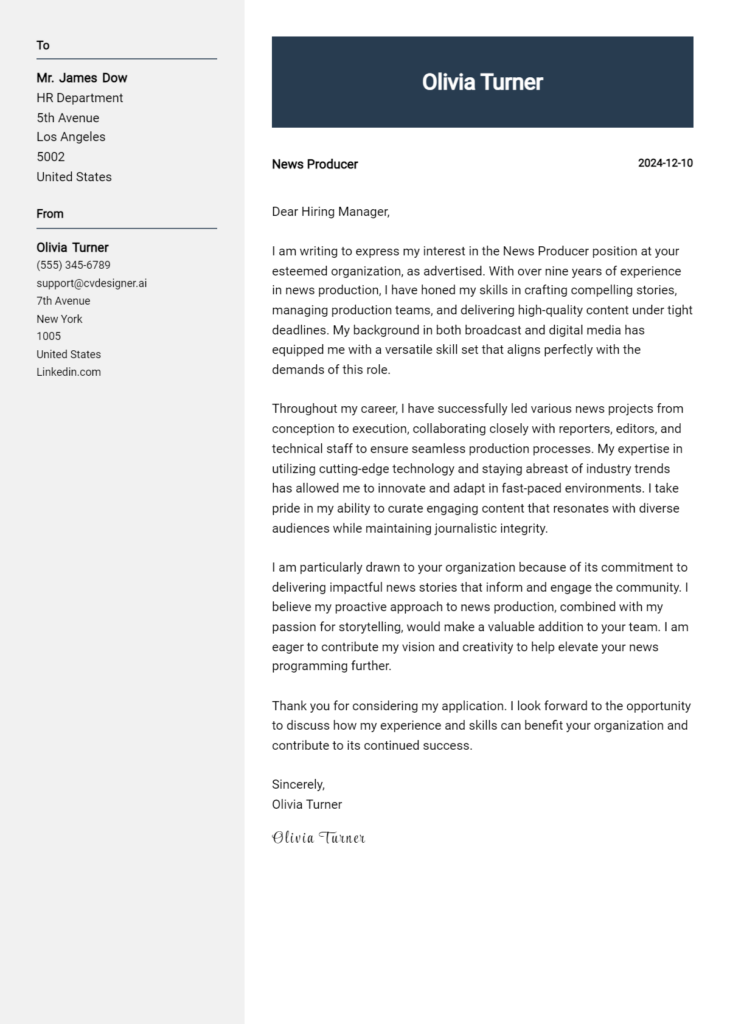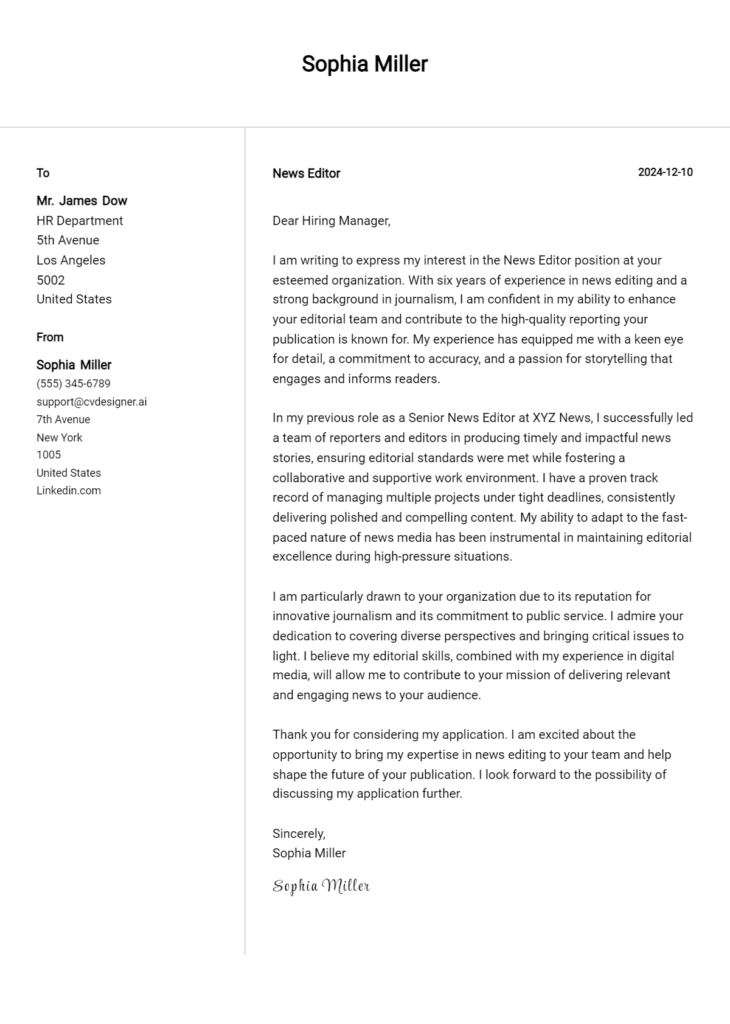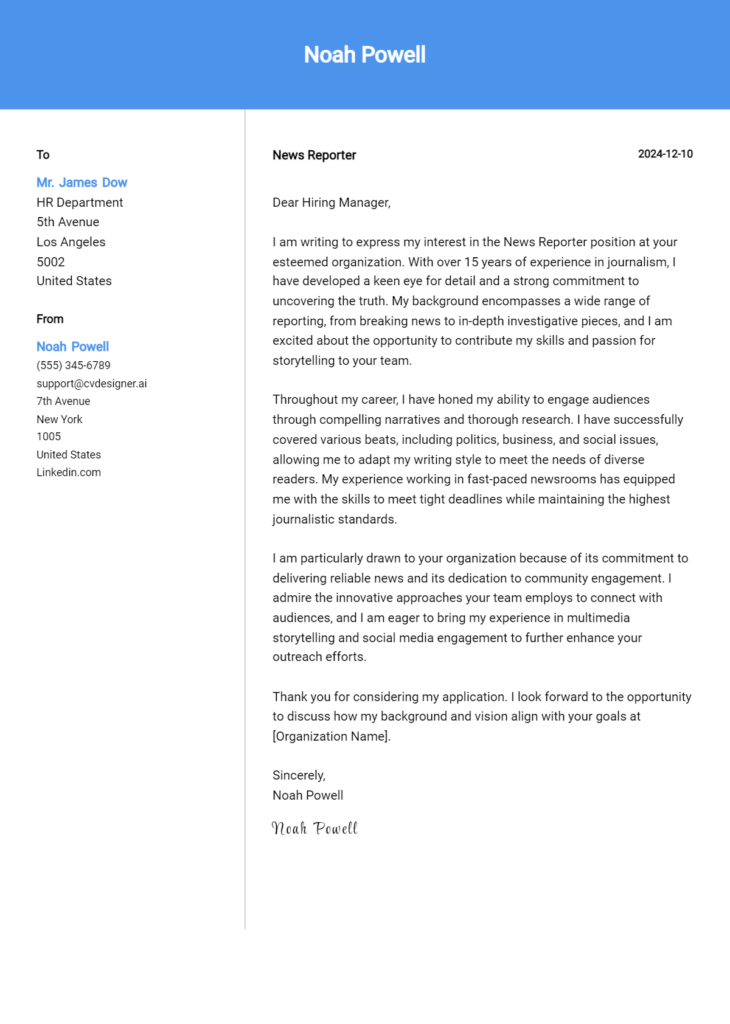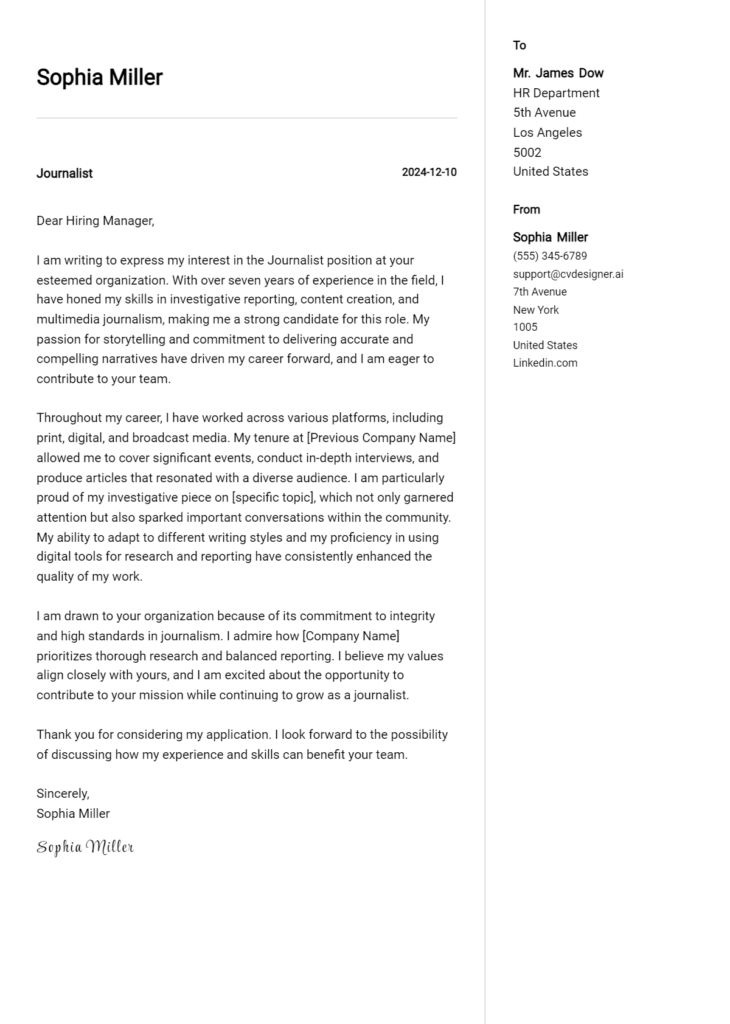Corporate Communications Cover Letter Examples
Explore additional Corporate Communications cover letter samples and guides and see what works for your level of experience or role.
How to Format a Corporate Communications Cover Letter?
Crafting a compelling cover letter is essential for anyone pursuing a position in Corporate Communications. Your cover letter serves as a reflection of your communication skills, creativity, and professionalism—qualities that are paramount in this field. The way you format your cover letter not only captures the attention of hiring managers but also demonstrates your ability to convey important information clearly and effectively.
In this guide, we will explore how to structure your cover letter, providing valuable insights and examples tailored for Corporate Communications professionals.
We will focus on the essential components of a professional cover letter, including:
- Cover Letter Header
- Cover Letter Greeting
- Cover Letter Introduction
- Cover Letter Body
- Cover Letter Closing
Each section plays a crucial role in showcasing your qualifications and enhancing your candidacy. Let’s break down each part to help you create a standout Corporate Communications cover letter.
Importance of the Cover Letter Header for Corporate Communications
The cover letter header is a critical component of your application for a Corporate Communications role, serving as the first impression for potential employers. A well-structured header not only conveys your professionalism but also provides essential contact information that facilitates communication. It should include your name, phone number, email address, the date, and the recipient’s name and title, along with their company name and address. Clarity and attention to detail in the header reflect your communication skills—key attributes in the field of Corporate Communications.
Strong Example
Jane Doe 123 Corporate Lane Business City, ST 12345 (123) 456-7890 jane.doe@email.com October 1, 2023 John Smith Director of Corporate Communications XYZ Company 456 Business Rd Business City, ST 12345
Weak Example
Jane Doe@xyz.com 123-456-7890 10/1/23
The Importance of a Strong Cover Letter Greeting
The greeting of a cover letter is crucial as it sets the tone for the entire document and showcases your professionalism and attention to detail. A well-crafted greeting not only reflects your communication skills but also demonstrates your interest in the company and the position by addressing the hiring manager directly. Personalizing your greeting can create a favorable impression and make your application stand out among others. To avoid generic greetings like "To Whom It May Concern," it’s beneficial to do some research and find out the recipient's name, which can often be found on the company website or LinkedIn. This small effort signifies your enthusiasm and dedication, making a positive impact on your potential employer.
Strong Greeting Example
Dear Ms. Johnson,
Weak Greeting Example
To Whom It May Concern,
The Importance of a Compelling Cover Letter Introduction for Corporate Communications
A well-crafted cover letter introduction is crucial for making a strong first impression in the field of Corporate Communications. This initial paragraph must capture the hiring manager's attention, convey your enthusiasm for the role, and provide a glimpse into your relevant skills or achievements. A powerful introduction can set the tone for the rest of your application, demonstrating your ability to communicate effectively—an essential skill in this profession. Below are examples of both strong and weak cover letter introductions that illustrate the impact of a well-written opening.
Strong Example
Dear [Hiring Manager's Name], I am excited to apply for the Corporate Communications Specialist position at [Company Name], as I am passionate about crafting impactful narratives that resonate with diverse audiences. With over five years of experience in corporate communications and public relations, I have successfully managed high-stakes projects, including a national rebranding campaign that increased our audience engagement by 40%. I am eager to bring my expertise in strategic messaging and stakeholder engagement to your esteemed team.
Weak Example
Dear [Hiring Manager's Name], I am applying for the Corporate Communications job because I need a new position. I have done some communications work in the past, and I think I could be a good fit for your company. I like your organization and would like to work there.
Purpose of the Cover Letter Body for Corporate Communications
The body of a cover letter for a Corporate Communications role serves as a vital platform for candidates to articulate their unique skills, experiences, and the value they can bring to the organization. This section should effectively highlight relevant projects or accomplishments that demonstrate the candidate's ability to manage communications strategies, engage stakeholders, and enhance brand reputation. By providing specific examples, candidates can illustrate their competencies in crafting press releases, managing social media campaigns, or leading internal communication initiatives, thereby making a compelling case for their fit within the company.
Strong Example
I successfully led a cross-functional team to develop and execute a comprehensive communication strategy for our company’s product launch, which resulted in a 30% increase in media coverage and a 25% boost in customer engagement within the first month. Additionally, I revamped our internal newsletter, increasing open rates from 15% to 50% through targeted content and design improvements. My ability to align communication objectives with business goals has consistently driven positive results and strengthened stakeholder relationships.
Weak Example
I have experience in communications and am looking for a job in this field. I worked on some projects and wrote a few emails. I think I would be a good fit for your company because I like communication and want to help people understand things better.
Importance of the Cover Letter Closing for Corporate Communications
The closing paragraph of a cover letter is crucial as it serves to summarize your qualifications, reiterate your enthusiasm for the position, and encourage the hiring manager to take the next steps, such as reviewing your resume or scheduling an interview. A well-crafted closing can leave a lasting impression, reinforcing your fit for the role while demonstrating your proactive approach.
Strong Example
Thank you for considering my application for the Corporate Communications position at XYZ Company. With a proven track record in strategic messaging and stakeholder engagement, I am excited about the opportunity to contribute to your team. I believe my skills align perfectly with the needs of your organization, and I look forward to the possibility of discussing my application further. Please feel free to review my resume for more details, and I would be delighted to schedule a time for an interview at your convenience.
Weak Example
I hope you will look at my resume soon. I think I would be good for the job. Let me know what you think.
Crafting a compelling cover letter for a Corporate Communications role is crucial for standing out in a competitive job market. This document serves as your first opportunity to showcase your technical skills, problem-solving abilities, understanding of the Software Development Life Cycle (SDLC), teamwork capabilities, and passion for continuous learning. By incorporating these elements effectively, you can leave a lasting impression on potential employers. Here are some tips to help you create an impactful cover letter.
Cover Letter Writing Tips for Corporate Communications
Highlight Technical Skills: Clearly outline your technical skills relevant to corporate communications, such as proficiency in content management systems, social media analytics, or graphic design software. Use specific examples to demonstrate how you have utilized these skills in previous roles to enhance communication strategies.
Showcase Problem-Solving Abilities: Provide examples of challenges you faced in your previous positions and how you addressed them. Describe the steps you took to resolve issues and the positive outcomes that resulted. This will illustrate your analytical thinking and initiative, which are vital in corporate communications.
Demonstrate Knowledge of SDLC: If applicable, mention your understanding of the Software Development Life Cycle and how it relates to communication in a tech-driven environment. Explain how you can effectively communicate project goals and updates, ensuring that all stakeholders are informed and engaged.
Emphasize Teamwork: Corporate communications often involves collaboration across various departments. Share instances where you worked as part of a team to achieve a common goal. Highlight your ability to communicate effectively with diverse groups and how that contributed to the success of the project.
Express a Passion for Continuous Learning: In a rapidly evolving field, showing a commitment to continuous learning is essential. Mention any courses, certifications, or workshops you have pursued to enhance your skills. This not only reflects your dedication to personal growth but also indicates your willingness to adapt to new trends and technologies in corporate communications.
For additional assistance, consider utilizing cover letter templates or a cover letter builder to streamline your writing process and ensure your cover letter is polished and professional.
Common Mistakes to Avoid in a Corporate Communications Cover Letter
Crafting a compelling cover letter is essential for standing out in the competitive field of Corporate Communications. Avoiding common pitfalls can significantly enhance your chances of making a positive impression. Here are several mistakes to steer clear of:
- Generic Greetings: Using "To Whom It May Concern" shows a lack of effort. Research the hiring manager's name and personalize your greeting.
- Repetition of the Resume: Your cover letter should complement your resume, not reiterate it. Focus on specific achievements and how they relate to the job.
- Ignoring the Job Description: Failing to tailor your content to the job description makes it easy for hiring managers to overlook your application. Highlight relevant skills and experiences that align with the role.
- Grammatical Errors: Typos and grammatical mistakes can undermine your professionalism. Always proofread your letter or use tools to check for errors.
- Lack of Enthusiasm: A cover letter that feels flat or disengaged can be a red flag. Convey your passion for the role and the company clearly.
- Inconsistent Formatting: A poorly formatted cover letter can distract from your content. Follow a clear cover letter format to ensure readability and professionalism.
- Missing a Call to Action: Conclude with a strong call to action, expressing your eagerness for an interview. This shows initiative and interest.
For more insights, you can explore cover letter examples to inspire your writing style and approach.
Cover Letter FAQs for Corporate Communications
What should I include in my cover letter for a Corporate Communications position?
In your cover letter for a Corporate Communications position, you should include your relevant experience, skills, and specific achievements that align with the job description. Start with a strong opening that captures your enthusiasm for the role and the company. Highlight your expertise in communication strategies, media relations, and crisis communication. Use concrete examples to demonstrate your ability to enhance brand reputation or manage internal communications. Additionally, mention any familiarity with digital communication tools and social media platforms, as these are increasingly important in corporate communications. Lastly, express your understanding of the company's mission and how you can contribute to its goals.
How can I tailor my cover letter for a specific company in Corporate Communications?
To tailor your cover letter for a specific company, start by researching the organization’s culture, values, and recent communications initiatives. Identify key projects or campaigns that resonate with your skills and experiences. In your letter, reference these initiatives to show your genuine interest in the company. Adjust your language to align with the company’s tone, whether it’s formal or more casual. Highlight experiences that directly relate to the company’s needs, such as managing public relations during a crisis or developing internal communication strategies. By demonstrating your knowledge of the company and how your background fits their objectives, you make a compelling case for why you’re the right candidate.
What format should I use for my Corporate Communications cover letter?
Your cover letter for a Corporate Communications position should follow a standard business letter format. Begin with your contact information at the top, followed by the date and the employer’s contact information. Use a professional salutation, such as “Dear [Hiring Manager’s Name].” Structure the body into three main sections: an introduction that states the position you’re applying for, a middle section detailing your relevant experience and skills, and a conclusion that reiterates your enthusiasm and suggests a follow-up. Keep the font professional and the layout clean, ensuring there are no typos or grammatical errors. Aim for a single page in length to maintain clarity and conciseness.
How important is the tone of my cover letter in Corporate Communications?
The tone of your cover letter is crucial in Corporate Communications, as it reflects your communication style and professionalism. A well-crafted tone can showcase your ability to adapt your messaging to different audiences, which is essential in this role. Aim for a balance between professionalism and approachability; you want to convey confidence without sounding overly formal. Use active voice and clear language to demonstrate your communication skills. Be mindful of the company culture—if it’s more traditional, a formal tone may be appropriate, whereas a creative or modern company may appreciate a more relaxed style. Ultimately, the tone should align with both your personality and the company’s branding.
Build your Cover Letter in minutes
Use an AI-powered cover letter builder and have your letter done in 5 minutes. Just select your template and our software will guide you through the process.

